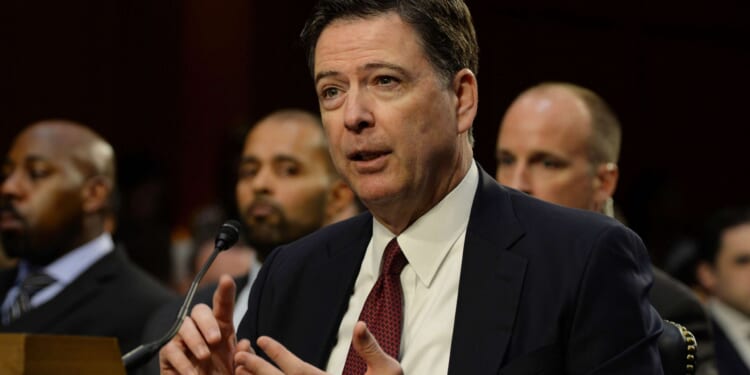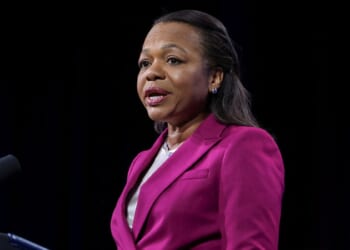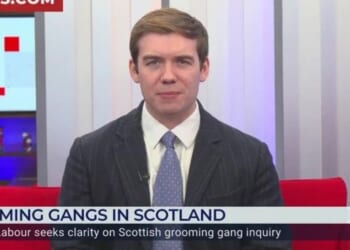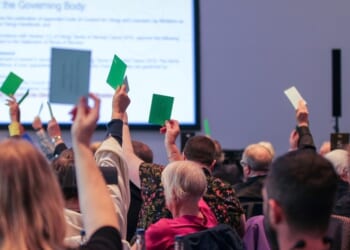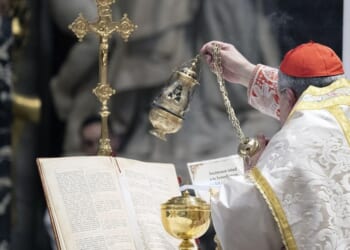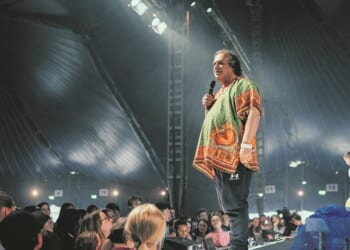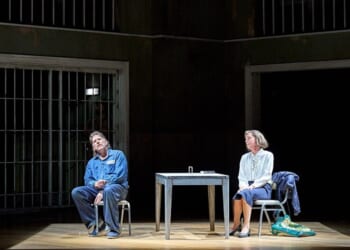Lindsey Halligan seemed out of her depth on Thursday evening, when she presented a two-count indictment of former FBI Director James Comey to a federal judge in Alexandria, Virginia. U.S. Magistrate Judge Lindsey Vaala was puzzled because she had received two versions of the indictment, both signed by the grand jury’s foreperson, that seemed inconsistent with each other.
Halligan, a defense lawyer with no prosecutorial experience whom President Donald Trump had appointed as the interim U.S. attorney for the Eastern District of Virginia just a few days earlier, said she had “only reviewed” one of the indictments, “did not see the other one,” and didn’t “know where that came from.” When Vaala pointed out that the document Halligan claimed she never saw “has your signature on it,” the neophyte prosecutor was nonplussed. “OK,” she said. “Well.”
That embarrassing episode reinforced the impression that Trump, in his eagerness to pursue a personal vendetta against Comey, had settled on an agent who was manifestly unqualified to run one of the country’s most prominent U.S. attorney’s offices. Trump’s desperate thirst for revenge, which was also evident in his public comments about the case, supports an argument that Comey’s lawyers are apt to make in seeking dismissal of the charges against him: that he is a victim of selective or vindictive prosecution.
A claim of selective prosecution alleges that the defendant was singled out for punishment when “similarly situated individuals” were not charged. Vindictive prosecution entails punishing a defendant for exercising his procedural rights. If Halligan files additional charges against Comey, for example, he could argue that she was retaliating against him for challenging the original indictment.
Such claims are rarely successful because they require evidence that a prosecutorial decision was influenced by improper motives. But in this case, there is no shortage of evidence that the decision to accuse Comey of lying to the Senate Judiciary Committee in September 2020 was driven by presidential pique.
Trump fired Comey in 2017 out of anger at the FBI investigation of alleged ties between his 2016 campaign and the Russian government. In the years since, Trump has made no secret of his desire to punish Comey for that “witch hunt,” which FBI Director Kash Patel cited in defending the indictment even though the charges are legally unrelated to the Russia probe.
Those charges, which include one count of “willfully and knowingly” making “a materially false, fictitious, and fraudulent statement” to Congress and one count of obstructing a congressional proceeding, were filed just five days before they would have been barred by the five-year statute of limitations. The Justice Department nearly missed that deadline because neither career prosecutors nor Halligan’s predecessor, Erik Seibert, thought there was sufficient evidence to justify the charges announced on Thursday.
According to news reports citing unnamed sources, top Justice Department officials, including Attorney General Pam Bondi and Deputy Attorney General Todd Blanche, were also skeptical. But the president was clear about what he wanted to happen.
“We can’t delay any longer,” Trump declared in a September 20 Truth Social post that directly addressed Bondi. “It’s killing our reputation and credibility. They impeached me twice, and indicted me (5 times!), OVER NOTHING. JUSTICE MUST BE SERVED, NOW!!!”
Who were “they”? Trump specifically mentioned Comey, along with two other nemeses: Sen. Adam Schiff (D–Calif.) and New York Attorney General Letitia James.
By that point, Trump had already fired Seibert and picked Halligan, who was sworn in two days later, to replace him. Trump described Halligan, who had served on his personal defense team, as “a really good lawyer.”
Judging from Halligan’s encounter with Vaala, that may have been an overstatement. “This has never happened before,” Vaala remarked. “I’ve been handed two documents [in the Comey case] that are inconsistent with one another. There seems to be a discrepancy. They’re both signed by the [grand jury] foreperson.”
One indictment listed the two charges approved by the grand jury, while the other mentioned a third count that the grand jury rejected, involving allegedly false statements during the same Senate hearing. The latter document, Vaala noted, described “a failure to concur in an indictment” but did not specify which count was rejected, so “it looks like they failed to concur across all three counts.” The judge said she was “a little confused as to why I was handed two things with the same case number that are inconsistent.”
The fact that the grand jury rejected any of the charges against Comey was itself remarkable. Because such proceedings entail a one-sided presentation of allegations that the government claims establish probable cause to believe a crime has been committed, grand juries almost never decline to indict. In fiscal year 2016, according to a Justice Department report, U.S. attorneys opened about 152,000 cases, just six of which ended in “no bill” from a grand jury.
It was even more striking that a U.S. attorney, confronted by such a rare situation, would accidentally submit two seemingly contradictory grand jury reports. Halligan’s confusion reflects both her inexperience and the unseemly haste with which she rushed to obtain the indictment demanded by the president before it was too late. Tellingly, that indictment was signed by Halligan alone, without the signatures of any underlings who agreed that the charges were legally justified.
After the indictment was announced, Trump publicly gloated. That evening, he described Comey as “one of the worst human beings this Country has ever been exposed to,” adding that “he has been so bad for our Country, for so long, and is now at the beginning of being held responsible for his crimes against our Nation.”
The next morning, Trump called Comey “A DIRTY COP.” That evening, he thanked Patel and “the outstanding members of the FBI” for “their brilliant work on the recent Indictment of the Worst FBI Director in the History of our Country, James ‘Dirty Cop’ Comey.” He said “the level of enthusiasm by the FBI was incredible” but understandable because “they knew Comey for what he is, and was”—i.e., “a total SLIMEBALL!”
Trump added an even worse insult while speaking to reporters on Friday. “James Comey essentially was a Democrat,” the president said. “He was worse than a Democrat.”
Although Trump suggested that Comey was getting what he deserved for being a terrible person, a “SLIMEBALL,” and “worse than a Democrat,” none of those is actually a crime. The accusation that Comey was “A DIRTY COP” came closer to conduct that might justify a criminal charge. But the indictment does not allege corruption or abuse of power. And despite Patel’s framing, it is not even legally related to “Russiagate.”
Rather, the indictment involves Comey’s reaffirmation of his earlier testimony that he never authorized anyone at the FBI to be “an anonymous source in news stories about matters relating to the Trump investigation or the Clinton investigation”—i.e., the FBI probe that examined Hillary Clinton’s handling of classified material as secretary of state, including her use of a private email server. That denial was a lie, the indictment says, because Comey “then and there knew” that “he in fact had authorized PERSON 3 to serve as an anonymous source in news reports regarding an FBI investigation concerning PERSON 1.”
The rejected count indicates that “PERSON 1” is Clinton, and the exchange with Sen. Ted Cruz (R–Texas) cited in the indictment suggests that “PERSON 3” is former FBI Deputy Director Andrew McCabe, who in 2016 authorized the disclosure of information about an FBI probe of the Clinton Foundation to The Wall Street Journal. The day after the Journal‘s story ran, McCabe claimed, he informed Comey of what he had done, and his boss expressed approval.
When the Justice Department’s Office of the Inspector General (OIG) investigated the leak, Comey contradicted that account, and the OIG credited his version of events. The resulting OIG report concluded that “McCabe did not tell Comey on or around October 31 (or at any other time) that he (McCabe) had authorized the disclosure of information about the [Clinton Foundation] Investigation to the WSJ.” It added that “had McCabe done so, we believe that Comey would have objected to the disclosure.”
In addition to that assessment, the case against Comey is complicated by doubts as to exactly what Comey was denying when he told Cruz that he stood by his earlier testimony, which involved the email investigation rather than the Clinton Foundation probe. It is not hard to see why Seibert and the prosecutors working for him did not think the case was worth pursuing.
None of that mattered to Trump, who was determined to get Comey one way or another. “The whole thing is just bizarro,” former federal prosecutor Andrew C. McCarthy, a legal analyst at National Review, told Politico. “This is the kind of thing that should never ever happen.…This case should never go to trial because it’s obvious from the four corners of the indictment that there’s no case.”
McCarthy elaborates on that point in a National Review essay. “The vindictive indictment the Trump Justice Department barely managed to get a grand jury to approve on Thursday is so ill-conceived and incompetently drafted, he should be able to get it thrown out on a pretrial motion to dismiss,” McCarthy writes, noting that the skimpy two-page indictment lacks “any description of the incident involving McCabe, Clinton, and Comey out of which the perjury charge supposedly arises.”
In any case, McCarthy says, McCabe “is not a credible witness, particularly on this subject.” The OIG, he notes, “found that Comey’s account that he did not approve the leak was overwhelmingly corroborated while McCabe’s account was full of holes.” And even if Halligan believes (or claims to believe) McCabe rather than Comey, McCabe did not claim that Comey “authorized” the Wall Street Journal leak—only that he expressed approval after the fact.
Halligan overlooked these problems in her eagerness to do what Trump wanted. The case against Comey is “the very definition of selective and vindictive prosecution,” says Joyce Vance, a former U.S. attorney for the Northern District of Alabama. “By demanding the prosecutions, Trump may have undercut any possibility of success by providing the people on his ‘enemies list’ with a built-in defense.”
Duke University law professor Samuel W. Buell was skeptical of that argument in an interview with The New York Times. “Trump’s being really crass and blatant about the ways he is talking about all that stuff,” Buell said. “But I don’t know that that’s going to give rise to a motion that would invalidate a whole prosecution.”
Jessica Roth, a professor at Cardozo School of Law, likewise noted that the case against Comey is “not like other cases where we typically see such claims.” But “that doesn’t mean it can’t fall within the concerns and the legal standards for vindictive and selection prosecution,” she added.
At the very least, Trump has given Comey’s lawyers ammunition they would not otherwise have. A former Eastern District of Virginia prosecutor, who “was granted anonymity because he fears retaliation for speaking about the case,” thinks Trump’s statements pose a serious problem for Halligan. “If I’m defending Comey, that Trump order to Pam Bondi to prosecute him, that’s a big problem,” he told Politico. “That’s going to bite them in a big way.…Comey could become the poster child for selective prosecution.”

